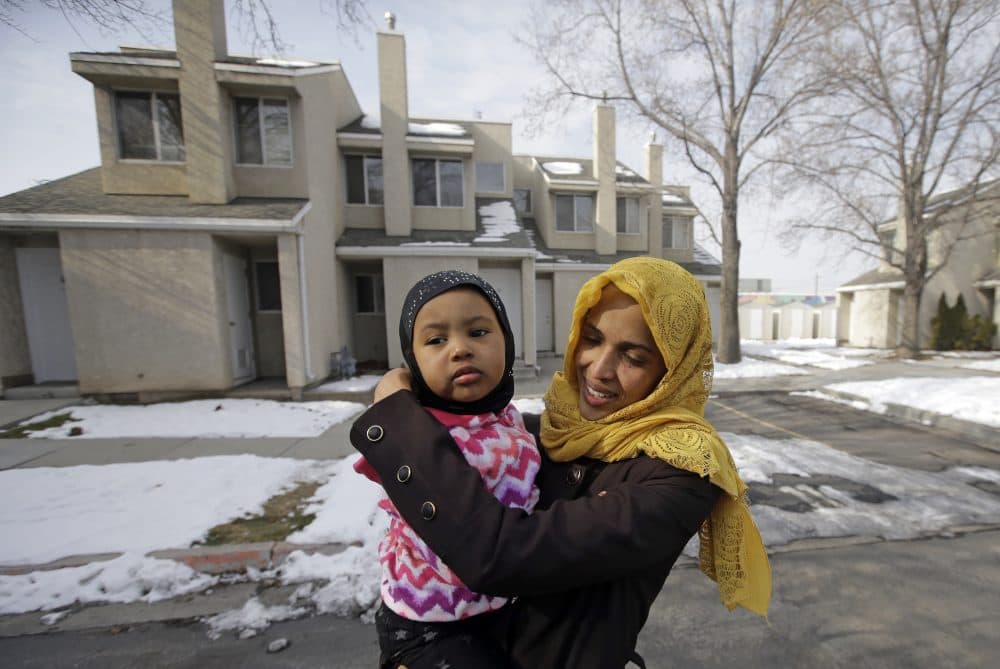Advertisement
What Happens To Somali Refugees Banned From U.S.?
Resume
Hundreds of Somali refugees were scheduled to enter the U.S. this week, but their plans have been put on hold by President Trump's travel ban. Somalia is one of seven majority-Muslim countries specified in the restrictions.
As the refugees wait, refugee camps in Kenya are also planning to close later this year, forcing Somalis to return to their country or look for refuge elsewhere.
Here & Now's Robin Young speaks with Abdi Samatar, a professor and chair at the University of Minnesota who focuses on Somalia, about the ban's impact.
Interview Highlights
On what is happening in Somalia
"The first thing is that Somalia is an orphan of the Cold War. The United States and the Soviet Union played havoc with the lives of that country, which ultimately led to its own collapse. That drove thousands, hundreds of thousands, of Somalis into the neighboring states, one of which was Kenya, where you had the largest refugee camp in a place called Dadaab. So really, if you look back at it, the United States — much like in Iraq and in Afghanistan — is politically and morally implicated in the disaster that's that country, and therefore, in my assessment, we owe them at least some modicum of support so that they can put their country back together, which we have not been doing very well."
On the likelihood of a Somali refugee being affiliated with a terrorist group
"I think all the evidence and the data we have point out that those who are affiliated with al-Shabab, if you like, or other terrorist groups, are not refugees. I think something to the order of 95 percent of those who have committed terrorist acts — either in Europe or here — are not refugees. And so what we are doing is we are using a jackhammer to get something small on the surface of the planet. I think we have destroyed those countries. I mean Iraq, there were no terrorists, there was no al-Qaida, but there was a dictator, so our wisdom told us that we have to get rid of the dictator, disband the army in that country, which was the fortress against al-Qaida. So the very people who are fleeing from terrorists are being told that you could not find refuge here, because where you live, there are terrorists. And it just doesn't make any sense. I think the president and his team could have been much more careful in vetting, saying, 'People, if you were vetted before, and you go through two years, give us another two months to work through this.' What this does in my opinion is to reinforce the ideas that al-Shabab and others have been propagating, that the United States is at war with Muslims."
"What we are doing is we are using a jackhammer to get something small on the surface of the planet."
Abdi Samatar, on the refugee ban as a means of preventing terrorism
On concerns about Somalis leaving the U.S. to join terrorist organizations
"That's a legitimate concern, but I think we need to put all the facts on the table. I teach here at the University of Minnesota — we have about 700 to 800 Somali students at different levels of the graduate, undergraduate programs. All of them are very good students getting on with their work. At some point some of these graduates were the largest number of, sort of, engineers for working at IBM here in Minnesota. And so I think we have to go after the individuals who are criminals. The vast majority of Somalis — over 99 percent who have come here as refugees — are doing well, superb citizens, support neighbors, stay out of crime. And so to be penalized is exactly what this country has gotten away from. Blanket descriptions of communities on the basis of individual criminals. That in my mind is against the values of the country and agains the Constitution of the United States."
On what will happen to Somali refugees if refugee camps are closed
"Many of them will have no choice but either to move further afield into the heart of Africa, or to go back to their country. I think one of the ways in which we can support those refugees to go back to their country is to provide the kind of resources so that the regime in Mogadishu — which is incredibly corrupt and which we have supported — gets its house in order, and that international community begins to put resources in developing Somali security forces that will replace the Kenyans and the Burundians and what have you, so that there is a 10,000 to 15,000 Somali security forces professionally, and if you can train that in a year or two, and they will drive al-Shabab into the sea, for me, that's the most certain way to support the refugees: to go back to their home and rebuild their country."
This segment aired on February 1, 2017.